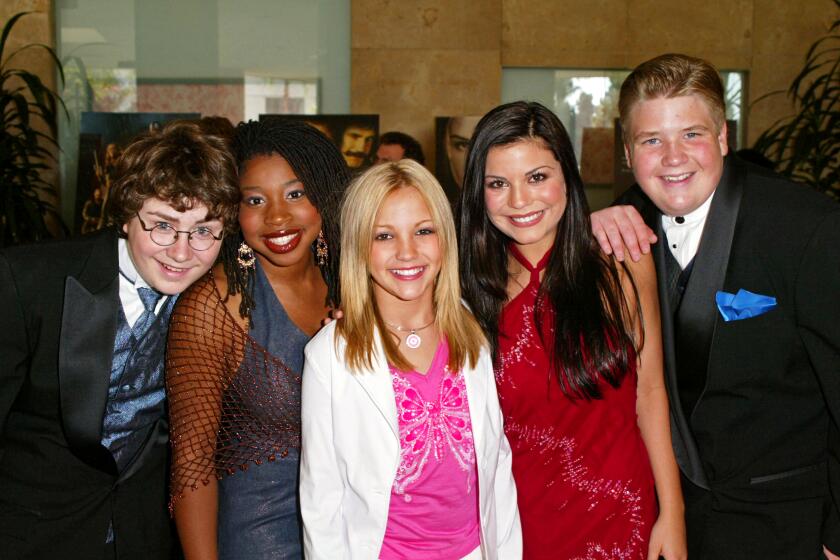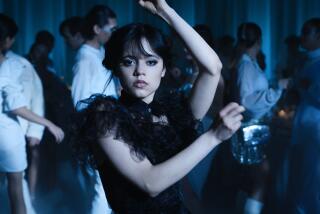From Hilary to Demi: Inside the ‘rise and fall’ of Disney Channel

- Share via
On the Shelf
Disney High: The Untold Story of the Rise and Fall of Disney Channel's Tween Empire
By Ashley Spencer
St. Martin’s Press: 336 pages, $30
If you buy books linked on our site, The Times may earn a commission from Bookshop.org, whose fees support independent bookstores.
The success of Disney Channel was kind of an accident. The halcyon days of the mid-2000s ushered in “High School Musical,” and the reach of “Hannah Montana” permeated pop culture beyond the tween audience it targeted. But before that, the Disney Channel was bumbling along since its launch in 1983, mostly broadcasting kids cartoons that harked back to the company’s animation renaissance in the early 1990s. It wasn’t until “Lizzie McGuire,” which starred Hilary Duff in the title role, that network executives realized what they had on their hands.
“Hilary and Lizzie were really what changed and shaped what came later with Miley and Selena and Demi,” says Ashley Spencer, author of “Disney High: The Untold Story of the Rise and Fall of Disney Channel’s Tween Empire” — out now.
Duff’s star power was undeniable, and the slightly aged-up — at least from the Saturday morning cartoon crowd — tween “Lizzie McGuire” audience hung on her every word. But, as Spencer contends in “Disney High,” it was a challenge to mobilize all the disparate Disney departments to capitalize on the show and Duff’s appeal. Though the channel paid the price for not signing the stars of “The All New Mickey Mouse Club,” including Britney Spears, Justin Timberlake and Christina Aguilera, to Disney record contracts while they were still on the show, Spencer writes, “they weren’t thinking like that. Yet.”

“Once the Disney record labels started cooperating with the Disney TV side and everyone recognized that there’s a mutual benefit to cross-promoting talent on both ends, that’s when you are starting to get Disney Channel stars who are also putting out record-breaking albums, who are going on concert tours, who are selling so much merchandise,” Spencer tells The Times. “That’s how it became so ever-present in American society in the mid-2000s. That’s when magic happened.”
Still, “Lizzie McGuire” only lasted for the then-requisite 65 episodes (enough to air reruns every weekday in 13-week scheduling blocks to fill out the calendar year), and while they did manage to harness the show’s success into the 2003 movie spinoff that still resonates today (most recently namechecked in the Rome sojourn in the new season of Netflix’s “Emily in Paris”), Duff’s fame and demand grew outside of Disney.
“The lesson that Disney Channel took from the show’s unprecedented success wasn’t that the network needed more single-camera, low-stakes comedies,” Spencer writes, “it was that it needed more stars. A marketable, beloved star like Hilary was the key that could unlock movie franchises, record deals and merchandising opportunities across the Disney landscape and bolster the Disney Channel brand on a whole new level. They were starting to see the future.”
Nickelodeon stars from hit shows including ‘Drake & Josh,’ ‘The Amanda Show’ and ‘Zoey 101’ spoke on ‘Quiet on Set’ about the conditions they faced as child actors. Here’s what they’re up to now.
Then came “That’s So Raven,” starring Raven-Symoné. The garish look and homogenized feel of the show directly informed the way future Disney Channel hits like “Wizards of Waverly Place” and “Sonny With a Chance” would appear.
“If every one [of these shows] had the same lighting and look, they would be perfectly happy with that, kind of like how Marvel is now,” says Disney Channel Original Movie producer Kevin Lafferty in “Disney High.”
These aforementioned stars whom Disney Channel built its brand around also signpost the network’s popularity peak in the 2000s that Spencer charts in “Disney High,” beginning with Duff and Raven-Symoné, followed by Miley Cyrus, Selena Gomez and Demi Lovato, where “Disney High” abruptly and fittingly ends. Lovato’s well-documented struggles with mental health and addiction saw her unable to return to “Sonny With a Chance,” which morphed into the one-season sketch show “So Random!” before being canceled altogether in 2011. (Lovato has been open about her past issues in documentaries, including in her recent directorial debut, Hulu’s “Child Star.”) Disney Channel aired reruns (after “Lizzie McGuire,” shows mostly broke the 65-episode rule) in perpetuity where, as Spencer writes, Lovato was “eternally grinning and unbothered, her every obstacle solved by the time the credits rolled.”

Hinging its brand on female stars was in stark contrast to competitor Nickelodeon, which largely consisted of, Spencer contends, “slime, farts and gross out humor” — and uncomfortable sexual innuendos that were referenced in the Investigation Discovery documentary “Quiet on Set: The Dark Side of Kids TV” earlier this year. Tween girls showed their loyalty to Disney stars and shows by buying up their merchandise. “Boys who were watching those shows didn’t want to buy a ‘Suite Life’ shirt with Zack and Cody on it,” says Spencer with a laugh about the Dylan and Cole Sprouse-starring show that aired on Disney Channel from 2005 to 2008.
The conservative, highly guarded ethos at the time meant that Disney Channel “couldn’t break out of” its image as a “[security] blanket for the kids of America.” Spencer thinks that has changed today. For example, “High School Musical: The Musical: The Series” — which airs on Disney+, not the Disney Channel — featured a kiss between “High School Musical’s” Ryan (Lucas Grabeel) and another man. Raven-Symoné had the option to play a queer character in “That’s So Raven” reboot “Raven’s Home,” to reflect her real-life sexuality (she ultimately turned that down because she didn’t think it was true to the character) and Gomez’s Alex Russo may be bisexual in the upcoming sequel series “Wizards Beyond Waverly Place.”
One thing’s for sure: the stymied “Lizzie McGuire” reboot was a bridge too far for Disney+ in the streamer’s early days. Set to be one of the cornerstones of its launch, Disney+ canceled the chronicles of a grown-up Lizzie due to apparently mature subject matter — a questionable decision given that Disney+ merged with the adult-skewed Hulu earlier this year.
With her queer anthem ‘Boyfriend’ and its biting follow-up ‘Breakfast,’ Dove Cameron has left her perky Disney days behind.
“The way kids are consuming content is so scattered,” she says. “The ratings [have] declined and declined and declined over the past decade.” It’s a far cry from the apex of “High School Musical 2’s” 17 million viewers in its premiere. “That’s a huge number that people would kill to get today.
“[Disney Channel] was so widespread that the kids that grew up with that are now adults and there is this shared memory,” Spencer says. “Especially with the TikTok clips and the memes, everyone can just relive that nostalgia.
“It will be really interesting to see what this generation of kids, when they look back in 10, 15 years, how they feel about the content they grew up with and what they’re nostalgic for in the way that the Disney Channel impacted kids who grew up in the 2000s. I don’t know — maybe it’s going to be that one TikTok they watched a thousand times!” Spencer laughs.
Eric Roberts’ memoir isn’t a Hollywood reclamation job designed to kick-start a once-buzzy career. Roberts knows all too well that his erratic behavior damaged his relationships with friends and family, including his sister Julia Roberts.
Disney Channel’s monoculture has fractured and now it’s not enough to be the star of one of its shows, Spencer says. People like Sabrina Carpenter and Olivia Rodrigo have blown up since starring on “Girl Meets World” and “High School Musical: The Musical: The Series,” respectively, and their current music is noticeably more risque than even Cyrus’ breakout hit, “Can’t Be Tamed,” which was released while she was still starring on “Hannah Montana” in 2010.
“The people who become stars for young kids now are just not the people who are on sitcoms on cable TV,” Spencer says. Instead it’s YouTubers and TikTokers. “A large part of it is an industry issue, not just a Disney issue.
“[Disney’s] priority is not that audience anymore,” Spencer continues. The rare recent Disney Channel successes are reboots like “Raven’s Home” and the “Descendants” franchise, which spins off from Disney’s animated classics and feeds into that nostalgia factor. “Wizards Beyond Waverly Place” seems poised to do the same, but will have a dual broadcast with Disney+, with all episodes dropping on the streamer the day after the first two premiere on Disney Channel. “Maybe [they’re] setting themselves up for the day not so far from now when there may not be a Disney Channel,” Spencer says.
More to Read
Sign up for our Book Club newsletter
Get the latest news, events and more from the Los Angeles Times Book Club, and help us get L.A. reading and talking.
You may occasionally receive promotional content from the Los Angeles Times.










